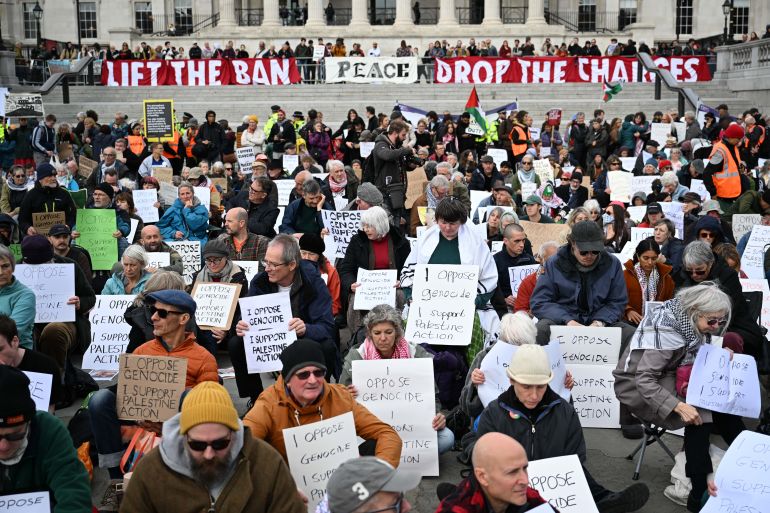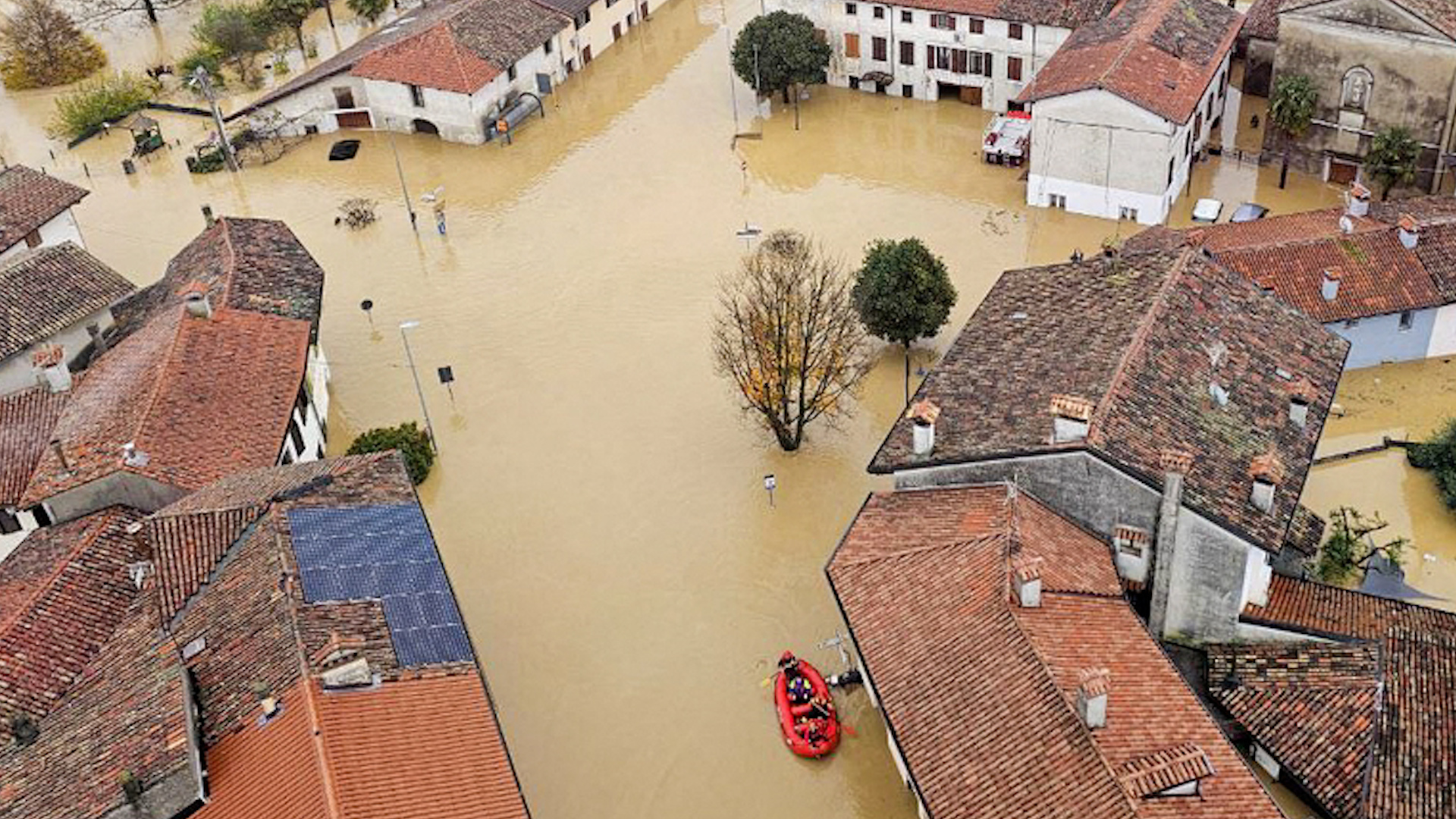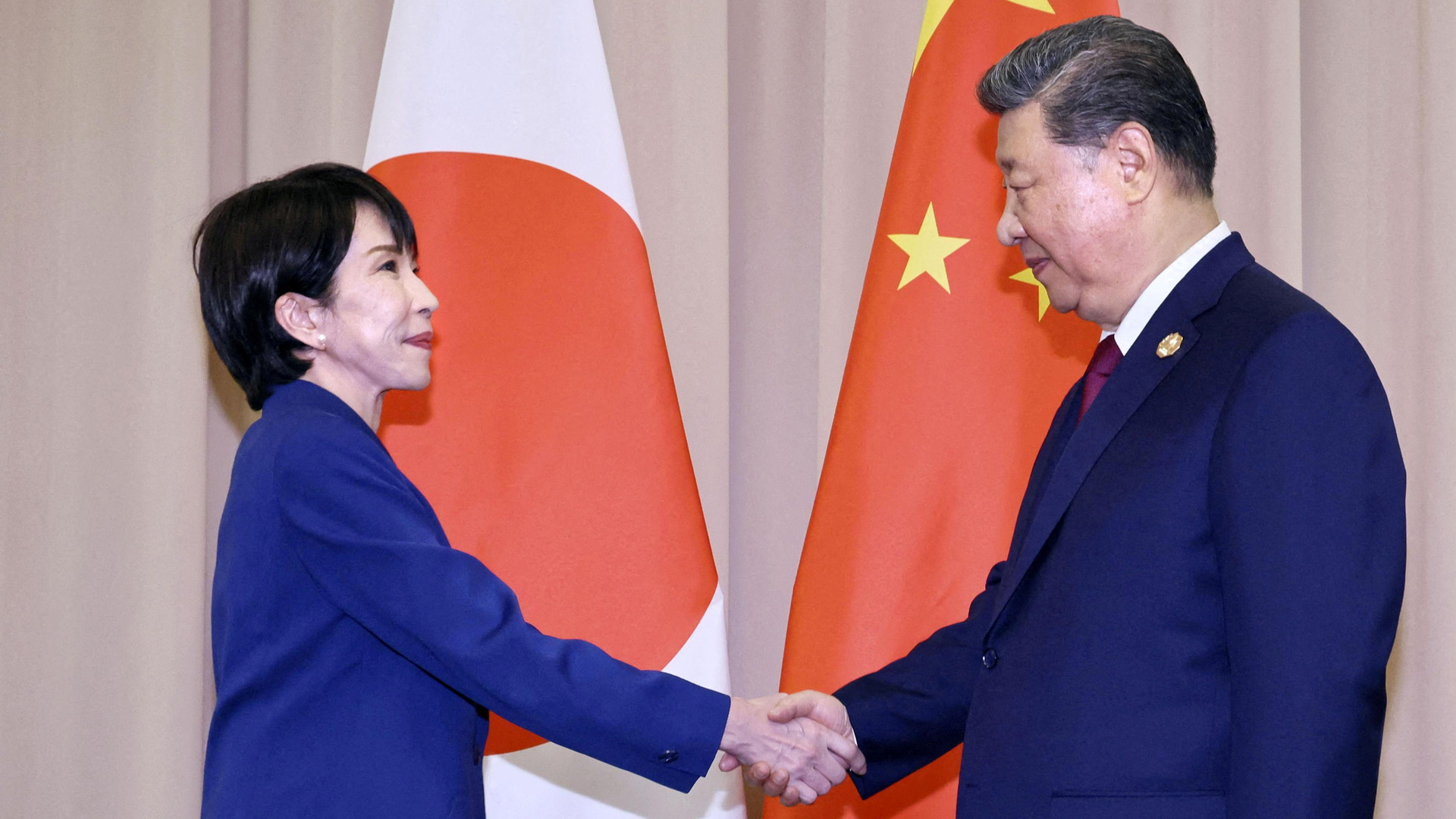Six members of the proscribed UK direct action group, Palestine Action, go on trial on Monday for allegedly damaging weapons at the UK base of Israeli defence firm Elbit Systems in August 2024.
The detainees, who are just some of a total of 24 activists linked to the group who have been arrested at different times, have been in custody for more than a year without trial, breaking the UK’s six-month pre-trial detention limit.
Recommended Stories
list of 4 itemsend of list
Their prosecution, which has drawn international scrutiny, has become a test case for how the British government under Prime Minister Keir Starmer is dealing with pro-Palestine demonstrations, with many UK residents and rights groups accusing authorities of heavy-handedness.
Thousands of people have demonstrated in support of the detained group, collectively known across the UK as the “Filton24”, named after the location of the targeted Elbit Systems offices in Filton, Bristol.
Hundreds of people have been arrested in recent weeks for demonstrating in solidarity with Palestine Action, which was banned under “anti-terror” laws in July.
At least 500 people, aged between 18 and 89, were detained at protests in London on October 4. Authorities said they had been arrested for “supporting a proscribed organisation”.
Here’s what we know about the court case starting this week:
What is happening and in which court?
Six Palestine Action members are being tried at Woolwich Crown Court in London. This is the first trial since the initial group of Filton24 members were arrested in August 2024, with others being arrested during subsequent police raids. All face charges of aggravated burglary, criminal damage and violent disorder.
This week’s case focuses on the six defendants who were caught on the premises of Elbit Systems on August 6, 2024.
According to the Free the Filton 24 group, formed by family and friends, they are: Zoe Rogers, Fatema Zainab (Ray) Rajwani, Jordan Devlin, Samuel Corner, and Charlotte “Lottie” Head. One other person has been identified by activist groups on social media only as “Ellie”. Most of the Filton24 appear to be UK citizens, but this has not been confirmed.
Other members of Palestine Action may be tried later in relation to the Elbit Systems incident.
They include: Ian Sanders, Madeleine Norman, William Plastow, Leona Kamio, Hannah Davidson, Teuta “T” Hoxha, Zahra Farooque, Yulia Brigadirova, Qesser Zuhrah, Heba Muraisi, Kamran Ahmed, Amu Gib and Aleksandra Herbich.
Sean Middleborough, 32, who told local media he had been arrested in a violent raid on his home last November, was the only one to be granted temporary bail to attend his brother’s wedding in October. He reportedly failed to return to prison in early November as scheduled, and the police are now searching for him, according to Sky News.
The names of the remaining five arrested members of Palestine Action are unknown.

What is Palestine Action?
Founded in July 2020 by activists Huda Ammori and Richard Barnard, Palestine Action describes itself as “a pro-Palestinian organisation which disrupts the arms industry in the United Kingdom with direct action”. The group has accused the UK government of complicity in Israeli war crimes in Gaza and says it is “committed to ending global participation in Israel’s genocidal and apartheid regime”.
The group’s members have targeted Israel-linked companies across the UK, spraying their facilities with trademark red paint. Members have also blocked entrances to buildings, chained themselves to infrastructure and damaged equipment.
In the wake of Israel’s war on Gaza, which began on October 7, 2023, the group’s demonstrations intensified. In October that year, its members targeted the BBC’s headquarters in London with red paint, in protest against the broadcaster’s perceived pro-Israel bias.
Its members also blocked the facilities of weapons manufacturers Lockheed Martin, a US aerospace and defence group in London, and Leonardo, a defence and security group.
What happened in Filton?
On August 6, 2024, Palestine Action’s members broke into the premises of the Israeli defence firm Elbit Systems in Filton, Bristol, and reportedly destroyed quadcopter drones, which the group says are used by the Israeli military in Gaza to target Palestinians.
The action was estimated to have caused more than 1 million pounds ($1.3m) in damage, according to local news outlets. Six activists were arrested at the scene – the same who are on trial on Monday.
Four others were arrested in connection with the Filton event in nationwide raids days after. Then, in November 2024, more raids saw the number of those arrested and held climb to 18. Later, in June 2025, a final raid led to six more people being arrested.
The detainees are being held in different prisons, including New Hall – for female and young offenders – located in West Yorkshire, and Pentonville in London. While they were initially held on charges of “terrorism”, those charges were later dropped, and all are now facing non-terror-related charges. According to the Free the Filton 24 group, formed by family and friends of the activists, nearly all the activists have been denied bail despite several applications.
At least six members began a hunger strike this month in protest against what they say is “systematic abuse” in the prisons, including wardens referring to them as “terrorists”, confiscating their clothing – including their Palestinian kefiyehs – and restricting their visits and letters. They include Amu Gib, Heba Muraisi, Jon Cink, Kamran Ahmed, Teuta “T” Hoxha and Qesser Zurah.
The group has vowed to refuse food until Elbit is shut down and prison authorities stop the alleged abuse.
What else has Palestine Action done?
In June 2025, the group announced that some of its members had cut through the outer fences of Brize Norton airbase in Oxfordshire, the largest station of the British Air Force, and sprayed red paint on the turbine engines of two Airbus Voyager aircraft.
The planes are used for air-to-air refuelling and have allegedly been used to refuel Israeli military fighter jets. The two activists involved used electric scooters to enter the compound and were able to escape unhindered.
Five people were later arrested and charged on July 3, 2025, in relation to the Brize Norton action: Muhammad Umer Khalid, Amy Gardiner-Gibson, Jony Cink, Daniel Jeronymides-Norie and Lewie Chiaramello. All are being charged with conspiracy to enter a prohibited place and conspiracy to commit criminal damage.
Analysts at the time said the breach, while not posing a direct military threat, was embarrassing for the UK’s Ministry of Defence, as aircraft used by the king and prime minister are normally stationed there.
Prime Minister Keir Starmer condemned the attack, calling it “disgraceful”. The spraying reportedly cost the UK between 7 million and 30 million pounds ($9.2-$39m) in damage, according to police officials and various UK broadcasters, although the government told news site Declassified UK that it has not estimated a precise figure.
Before it intensified its demonstrations against Israel’s genocidal war on Gaza, the Palestine Action group’s members were also noted for:
- A series of break-ins at Elbit’s Ferranti site in Oldham, near Manchester in northern England, between 2020 and 2022.
- Occupying the Leicester drone factory operated by UAV Tactical Systems, a subsidiary of Elbit, in May 2021, with activists chaining themselves to the roof for nearly a week.
- Chaining themselves to an Elbit site in Braunstone, Leicestershire, in April 2022, and breaking into the Thales UK factory in Glasgow in June 2022, causing more than 1 million pounds ($1.37m) in damage with smoke bombs and property destruction.
- Following the launch of Israel’s war on Gaza in October 2023, Palestine Action intensified its efforts. It targeted the BBC’s headquarters in London with red paint to protest against the broadcaster’s perceived pro-Israel bias and blockaded facilities of arms manufacturers, including Lockheed Martin, the US aerospace and defence group, which has a base in London, and Leonardo, the defence and security group.
- In November 2023, the group’s US branch occupied the roof of an Elbit facility in Merrimack, New Hampshire. Three activists were arrested but were later released on misdemeanour charges.
Why did the UK government proscribe them as a ‘terrorist’ organisation?
In July, following the Brize Norton incident, the UK parliament voted overwhelmingly to proscribe Palestine Action as a “terrorist” group, making it a criminal offence to join or support the group, subject to a jail sentence of 14 years. That puts the group in the same category as armed groups, such as al-Qaeda.
The UK government said it proscribed Palestine Action for national security reasons. By doing so, “the government is demonstrating its zero tolerance approach to terrorism, regardless of its form or underlying ideology”, a statement read, adding that the group had orchestrated “aggressive and intimidatory attacks” against businesses, institutions, and the public in violation of the UK’s Terrorism Act of 2000.
“National security is the government’s first priority, and it will not shy away from this responsibility,” the government’s statement read, adding that the right to “legitimate” protests will be protected.
What are the arguments against this?
The move has drawn widespread condemnation from pro-Palestine campaigners in the UK and rights groups. Hundreds of people marching in support of the group’s detained members, and condemning the proscription, have been arrested, according to the UK authorities.
UN human rights chief Volker Turk warned days after the ban that the move represented a “misuse” of the country’s terrorism laws, as it was being applied to conduct that is not “terrorist” in nature – Palestine Action is not an armed group and its members have not killed or seriously injured anyone, nor have they threatened to do so.
Amnesty International described the government’s move as “disturbing” and called on the UK to instead focus on taking action against Israel.
“Instead of taking draconian measures to [proscribe Palestine Action], the Government should be taking immediate and unequivocal action to put a stop to Israel’s genocide and end any risk of UK complicity in it,” Sacha Deshmukh, Amnesty International UK’s chief executive, said.
Palestine Action, meanwhile, argues that its actions are a form of civil resistance aimed at disabling weapons production.
BREAKING: The government LOST their appeal and failed to stop the legal challenge of the Palestine Action ban.
That means the Judicial Review will go ahead on November 25-27th.
Not only that, but we won TWO MORE grounds to argue the illegality of the ban.
Huge victory.
In October, cofounder Huda Ammori was granted permission by a UK court to challenge the proscription on the grounds that it constitutes a disproportionate interference with free speech rights, after the UK government tried to block her appeal. The case is due to be heard between November 25 and 27.
Which other groups are proscribed as ‘terrorists’ in the UK and what for?
- Ideological armed groups such as al-Qaeda and ISIS are proscribed by the UK. Al-Qaeda has been linked to major attacks in the UK, such as the London bombings of 2005, in which 56 people were killed and more than 700 were injured. These groups are also proscribed by many other governments.
- On the same day the UK proscribed Palestine Action as a “terrorist” group, the Maniacs Murder Cult (MMC) and the Russian Imperial Movement (RIM) were also classified in the same category. Both groups are described as white supremacist groups, with MMC believed to have neo-Nazi leanings, and reportedly encouraging members to film themselves being violent to others.






